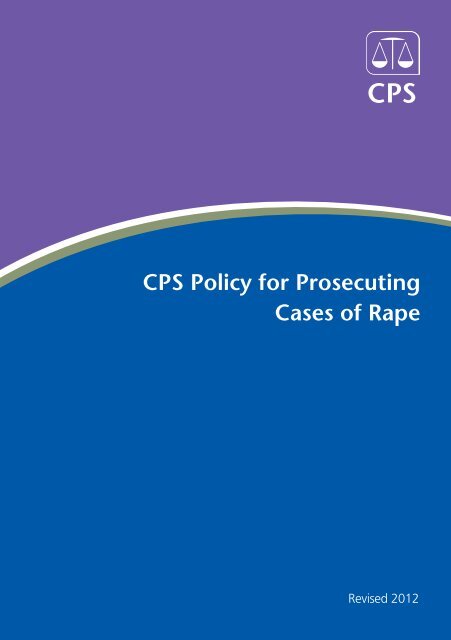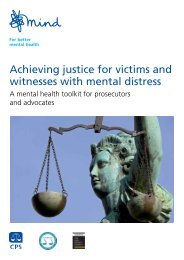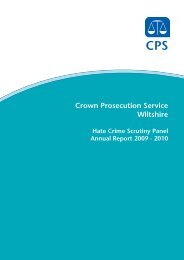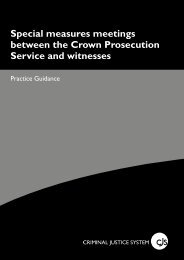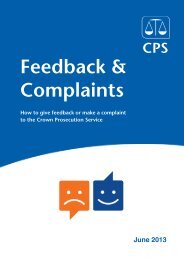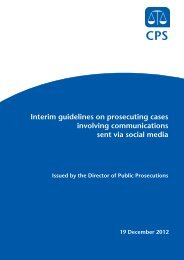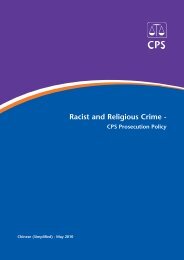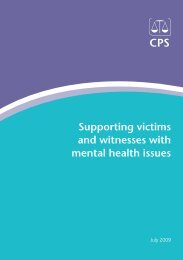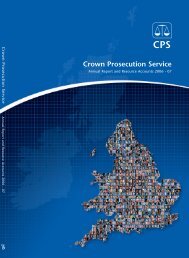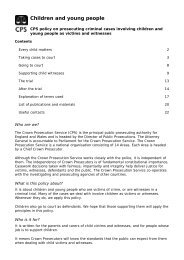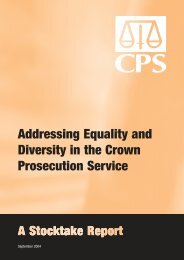CPS Policy for Prosecuting Cases of Rape - Crown Prosecution ...
CPS Policy for Prosecuting Cases of Rape - Crown Prosecution ...
CPS Policy for Prosecuting Cases of Rape - Crown Prosecution ...
- No tags were found...
You also want an ePaper? Increase the reach of your titles
YUMPU automatically turns print PDFs into web optimized ePapers that Google loves.
<strong>CPS</strong> <strong>Policy</strong> <strong>for</strong> <strong>Prosecuting</strong><strong>Cases</strong> <strong>of</strong> <strong>Rape</strong>Revised 2012
<strong>CPS</strong> <strong>Policy</strong> <strong>for</strong> <strong>Prosecuting</strong> <strong>Cases</strong> <strong>of</strong> <strong>Rape</strong>Contents1 Introduction 22 What is the definition <strong>of</strong> rape? 53 The role <strong>of</strong> the <strong>CPS</strong> 84 The Code <strong>for</strong> <strong>Crown</strong> Prosecutors 115 Is there enough evidence to prosecute? 146 Bail issues 227 Helping victims and witnesses to give evidence 248 Accepting pleas 359 Sentencing 3610 Keeping victims in<strong>for</strong>med 3911 Community engagement 4112 Complaints 4213 Conclusion 4314 Glossary 44Annex A: Contact details <strong>for</strong> some <strong>of</strong> the organisations thatprovide help or in<strong>for</strong>mation to victims <strong>of</strong> rape andpr<strong>of</strong>essionals working with victims 481
<strong>CPS</strong> <strong>Policy</strong> <strong>for</strong> <strong>Prosecuting</strong> <strong>Cases</strong> <strong>of</strong> <strong>Rape</strong>1 Introduction1.1 This policy statement explains the way we, the <strong>Crown</strong><strong>Prosecution</strong> Service (<strong>CPS</strong>), deal with cases in which anallegation <strong>of</strong> rape has been made. It gives advice on whatthe <strong>CPS</strong> does, how rape cases are prosecuted, and whatvictims can expect from the <strong>CPS</strong>. The document isparticularly designed <strong>for</strong> those who support victims <strong>of</strong> rape,whether pr<strong>of</strong>essionally or personally, although it may be <strong>of</strong>interest to victims, witnesses and the general public.1.2 This is the second edition <strong>of</strong> the policy statement andreflects the changes in the law and <strong>CPS</strong> procedures thathave taken place since the publication <strong>of</strong> the first edition in2004. <strong>Rape</strong> is one <strong>of</strong> the most serious <strong>of</strong> all criminal<strong>of</strong>fences. It can inflict lasting trauma on victims and theirfamilies. We want people to know that our aim is toprosecute rape cases effectively, and we want people toknow what they can expect from us.1.3 We are aware that there is a general perception that mostrapes are committed by a single man against a womanunknown to him. In fact, the majority <strong>of</strong> rape victims arewomen and most know their rapist. However, rape caninvolve male and female victims <strong>of</strong> all ages. This policystatement covers the handling <strong>of</strong> all types <strong>of</strong> rape case,including marital and relationship rape, acquaintance andstranger rape, against male and female victims. All areequally serious and traumatic <strong>for</strong> the victim. <strong>Rape</strong> also has adevastating effect on families <strong>of</strong> victims.1.4 <strong>Cases</strong> <strong>of</strong> rape where the victim is a child present additionalchallenges. We will take account <strong>of</strong> the needs <strong>of</strong> abused2
<strong>CPS</strong> <strong>Policy</strong> <strong>for</strong> <strong>Prosecuting</strong> <strong>Cases</strong> <strong>of</strong> <strong>Rape</strong>1.7 We currently work with Independent Sexual ViolenceAdvisors and a number <strong>of</strong> national and local organisations(<strong>for</strong> example the Witness Service provided by VictimSupport), which <strong>of</strong>fer support to victims throughout theproceedings. Special measures can be used to help a victimor witness to give evidence.1.8 Although this policy statement applies specifically to rape,we will strive to apply best practices and procedures to allother types <strong>of</strong> sexual <strong>of</strong>fence prosecuted, and ensure thatthese cases are treated seriously and sensitively.1.9 Some words and phrases used in this document may not befamiliar to everybody. We have there<strong>for</strong>e set out a glossary<strong>of</strong> terms at the back <strong>of</strong> this document in which we havedefined some <strong>of</strong> the words and phrases used.4
<strong>CPS</strong> <strong>Policy</strong> <strong>for</strong> <strong>Prosecuting</strong> <strong>Cases</strong> <strong>of</strong> <strong>Rape</strong>2 What is the definition <strong>of</strong> rape?2.1 The definition <strong>of</strong> rape was substantially changed by theSexual Offences Act 2003, which came into <strong>for</strong>ce on 1 May2004.2.2 Offences committed be<strong>for</strong>e 1 May 2004 are prosecutedunder the Sexual Offences Act 1956. Under the 1956 Act,the statutory definition <strong>of</strong> rape is any act <strong>of</strong> non-consensualintercourse by a man with a person, and the victim can beeither male or female. Intercourse can be vaginal or anal. Itdoes not include non-consensual oral sex. The courts haddefined consent as having its ordinary meaning, and lack <strong>of</strong>consent could be inferred from the surroundingcircumstances, such as submission through fear. It is adefence if the defendant believed that the victim wasconsenting, even if this belief was unreasonable, and this isa matter <strong>of</strong> fact <strong>for</strong> the jury.2.3 Offences committed on or after 1 May 2004 are prosecutedunder the Sexual Offences Act 2003. The 2003 Act extendsthe definition <strong>of</strong> rape to include the penetration by a penis<strong>of</strong> the vagina, anus or mouth <strong>of</strong> another person. The 2003Act also changes the law about consent and belief inconsent.2.4 The word "consent" in the context <strong>of</strong> the <strong>of</strong>fence <strong>of</strong> rape isnow defined in the Sexual Offences Act 2003. A personconsents if he or she agrees by choice, and has the freedomand capacity to make that choice. The essence <strong>of</strong> thisdefinition is the agreement by choice. The law does notrequire the victim to have resisted physically in order toprove a lack <strong>of</strong> consent. The question <strong>of</strong> whether the victim5
<strong>CPS</strong> <strong>Policy</strong> <strong>for</strong> <strong>Prosecuting</strong> <strong>Cases</strong> <strong>of</strong> <strong>Rape</strong>consented is a matter <strong>for</strong> the jury to decide, although weconsider this issue very carefully throughout the life <strong>of</strong> thecase. The prosecutor will take into account evidence <strong>of</strong> allthe circumstances surrounding the <strong>of</strong>fence.2.5 We are aware that the meaning <strong>of</strong> consent can be <strong>of</strong>particular relevance in rape where there has been, or is, apre-existing relationship between the defendant and thevictim, or where domestic violence has existed prior to therape. As the 2003 Act makes it clearer what is meant by theterm “consent”, it should help juries decide whether thevictim was able to, and did in fact, give his or her consent atthe time.2.6 The Sexual Offences Act 2003 requires the defendant toshow that his belief in consent was reasonable. In decidingwhether the belief <strong>of</strong> the defendant was reasonable, a jurymust have regard to all the circumstances, including anysteps he has taken to ascertain whether the victimconsented. In certain circumstances, there is a presumptionthat the victim did not consent to sexual activity and thedefendant did not reasonably believe that the victimconsented, unless he can show otherwise. Examples <strong>of</strong>circumstances where the presumption applies are where thevictim was unconscious, drugged, abducted or subject tothreats or fear <strong>of</strong> serious harm.2.7 People who have consumed alcohol may reach such a level<strong>of</strong> drunkenness that they no longer have the capacity togive consent. The courts recognise that this stage may bereached well be<strong>for</strong>e they become unconscious.6
<strong>CPS</strong> <strong>Policy</strong> <strong>for</strong> <strong>Prosecuting</strong> <strong>Cases</strong> <strong>of</strong> <strong>Rape</strong>2.8 Proving the absence <strong>of</strong> consent is usually the most difficultpart <strong>of</strong> a rape prosecution, and is the most common reason<strong>for</strong> a rape case to fail. Prosecutors will look <strong>for</strong> evidencesuch as injury, struggle, or immediate distress to help themprove that the victim did not consent, but frequently theremay be no such corroborating evidence. This does not meanthat these cases can never be successfully prosecuted, but itdoes mean that they are more difficult. In the absence <strong>of</strong>any other evidence to help prove the victim did not consent,there is the possibility that some cases may fail to meet theevidential stage <strong>of</strong> the Code <strong>for</strong> <strong>Crown</strong> Prosecutors: (seeparagraph 4.2).2.9 We recognise that both men and women can be victims.Although the majority <strong>of</strong> victims are women, and takingaction against rape is included as part <strong>of</strong> the <strong>CPS</strong> ViolenceAgainst Women Strategy, we will apply our rape policywithout discrimination in all cases.7
<strong>CPS</strong> <strong>Policy</strong> <strong>for</strong> <strong>Prosecuting</strong> <strong>Cases</strong> <strong>of</strong> <strong>Rape</strong>3 The role <strong>of</strong> the <strong>CPS</strong>3.1 The <strong>CPS</strong> is one part <strong>of</strong> the criminal justice system, whichincludes other organisations such as the police, the courts,defence lawyers, the National Offender ManagementService, Youth Offender Teams (YOTs), the Witness Serviceand the Prison Service.3.2 We are a public prosecution service <strong>for</strong> England and Wales,headed by the Director <strong>of</strong> Public <strong>Prosecution</strong>s. We were setup in 1986 to prosecute cases investigated by the police.Although we work closely with the police, we areindependent <strong>of</strong> them. We are answerable to Parliamentthrough the Attorney General, who is the senior Law Officer<strong>of</strong> the <strong>Crown</strong> and also a Government Minister.3.3 We are a national organisation consisting <strong>of</strong> 42 Areas, plusan out-<strong>of</strong>-hours service called ‘<strong>CPS</strong> Direct’. Each Area isheaded by a Chief <strong>Crown</strong> Prosecutor and corresponds to asingle police <strong>for</strong>ce area, with one Area covering London.The 42 Areas are now grouped into 14 Strategic Boards,excluding <strong>CPS</strong> London, which has a management team <strong>of</strong>its own, led by the Chief <strong>Crown</strong> Prosecutor <strong>of</strong> London. EachStrategic Board is led by a Group Chair Chief <strong>Crown</strong>Prosecutor.3.4 The police are responsible <strong>for</strong> investigating allegations <strong>of</strong>rape and <strong>for</strong> gathering the evidence. In more serious orcomplex cases, we decide whether a person should becharged with a criminal <strong>of</strong>fence, and, if so, what that<strong>of</strong>fence should be.The police do not refer every complaint<strong>of</strong> a criminal <strong>of</strong>fence to us. However, where a policedecision maker considers there is sufficient evidence to8
<strong>CPS</strong> <strong>Policy</strong> <strong>for</strong> <strong>Prosecuting</strong> <strong>Cases</strong> <strong>of</strong> <strong>Rape</strong>charge the <strong>of</strong>fence <strong>of</strong> rape, they must refer that case to a<strong>Crown</strong> Prosecutor, who will make the decision whether tocharge. The Director’s Guidance on Charging, 4th editionparagraphs 4 and 5, provides further detail.3.5 The <strong>CPS</strong> and the police have signed a joint national protocolagreeing to adhere to best practice and policies in theinvestigation and prosecution <strong>of</strong> rape cases.3.6 As part <strong>of</strong> our commitment to improve the prosecution <strong>of</strong>rape cases, we have established a network <strong>of</strong> specialistprosecutors in each <strong>CPS</strong> Area. The <strong>CPS</strong> has set down astandard <strong>for</strong> rape specialist prosecutors, as our specialistprosecutors in each <strong>of</strong> the 42 <strong>CPS</strong> Areas are expected to betrained and experienced in prosecuting rape and othersexual <strong>of</strong>fence cases. The specialist network also providesmutual support to rape specialist prosecutors by enablingthem to share knowledge and experience. This rein<strong>for</strong>cestheir expertise and assists future rape prosecutions.3.7 Early consultation will take place between the specialistprosecutor and the police to ensure that all possible avenues<strong>of</strong> evidence are explored and that the correct charge isidentified. We intend wherever possible that the samespecialist prosecutor will be responsible <strong>for</strong> the case frombeginning to end and will work closely with the policethroughout. This degree <strong>of</strong> continuity is important. Itenables us to ensure that the victim is provided with thebest possible support throughout the progress <strong>of</strong> the case.3.8 If, following the receipt <strong>of</strong> an evidential report from thepolice, a rape specialist prosecutor decides that the caseshould not proceed, a second rape specialist must confirmthe decision.9
<strong>CPS</strong> <strong>Policy</strong> <strong>for</strong> <strong>Prosecuting</strong> <strong>Cases</strong> <strong>of</strong> <strong>Rape</strong>3.9 Since 1 October 2007, only prosecution advocates whohave attended a <strong>CPS</strong> accredited course and havedemonstrated the right skills while being monitored are ableto undertake rape prosecutions in court.10
<strong>CPS</strong> <strong>Policy</strong> <strong>for</strong> <strong>Prosecuting</strong> <strong>Cases</strong> <strong>of</strong> <strong>Rape</strong>4 The Code <strong>for</strong> <strong>Crown</strong>Prosecutors4.1 The Code <strong>for</strong> <strong>Crown</strong> Prosecutors (The Code) sets out howwe make decisions about whether or not to prosecute. TheCode is a public document. We review the cases referred tous by the police in line with the test set out in the Code. TheFull Code test has two stages.The evidential stage4.2 We must be satisfied first <strong>of</strong> all that there is enoughevidence to provide a realistic prospect <strong>of</strong> conviction againsteach defendant on each charge. This means that a jury or ajudge hearing a case alone, properly directed in accordancewith the law, is more likely than not to convict thedefendant <strong>of</strong> the alleged charge.4.3 The test that we use to decide whether or not to prosecuteis different from the one applied by the court be<strong>for</strong>e it mayconvict a defendant. For there to be a conviction, we haveto prove the case so that the court is sure <strong>of</strong> the defendant’sguilt.4.4 If the case does not pass the evidential stage, it must not goahead, no matter how important or serious it may beThe public interest stage4.5 If the case does pass the evidential stage, we must decide ifa prosecution is needed in the public interest. A prosecutionwill usually take place unless: “there are public interestfactors tending against prosecution which clearly outweigh11
<strong>CPS</strong> <strong>Policy</strong> <strong>for</strong> <strong>Prosecuting</strong> <strong>Cases</strong> <strong>of</strong> <strong>Rape</strong>those tending in favour” (Code <strong>for</strong> <strong>Crown</strong> Prosecutors). Ifthe evidential test is passed, we believe that rape is soserious that a prosecution is almost certainly required in thepublic interest.4.6 When considering the public interest stage, one <strong>of</strong> thefactors that <strong>Crown</strong> Prosecutors should always take intoaccount is: “the consequences <strong>for</strong> the victim <strong>of</strong> the decisionwhether or not to prosecute; and any views expressed bythe victim or the victim’s family”: paragraph 5.12 <strong>of</strong> theCode. We always think very carefully about the interests <strong>of</strong>the victim when we decide where the public interest lies.But we prosecute cases on behalf <strong>of</strong> the public at large andnot just in the interests <strong>of</strong> any particular individual. Strikingthis balance can be difficult. The views and interests <strong>of</strong> thevictim are important, but they cannot be the final word onthe subject <strong>of</strong> a <strong>CPS</strong> prosecution.The Threshold Test4.7 <strong>Crown</strong> Prosecutors will apply the Full Code Test whereverpossible. However, there will sometimes be cases when theperson arrested will be considered unsuitable to be grantedbail but when not all the evidence is available at the time acharging decision has to be made.4.8 In such cases, when the investigation is incomplete, the <strong>CPS</strong>may apply the Threshold Test. However, the Threshold Testcan only be applied when all the following conditions aremet:12• there is insufficient evidence to apply the Full Code Test;• there are reasonable grounds <strong>for</strong> believing better evidencewill be available in a reasonable time;
<strong>CPS</strong> <strong>Policy</strong> <strong>for</strong> <strong>Prosecuting</strong> <strong>Cases</strong> <strong>of</strong> <strong>Rape</strong>• the seriousness <strong>of</strong> the circumstances justifies the making<strong>of</strong> an immediate charging decision; and• there are continuing substantial grounds to object to bail.4.9 Where all these conditions are met, the Threshold Test maybe applied and the suspect charged. A decision to chargeunder the Threshold Test must be kept under review and theFull Code Test must be applied to the case as soon asreasonably practicable.13
<strong>CPS</strong> <strong>Policy</strong> <strong>for</strong> <strong>Prosecuting</strong> <strong>Cases</strong> <strong>of</strong> <strong>Rape</strong>5 Is there enough evidence toprosecute?5.1 <strong>Rape</strong> usually takes place in a private setting where the victimis the only witness. Unless the defendant pleads guilty, thevictim will almost certainly have to give evidence in court.Where there is conflicting evidence, the prosecutor has aduty to assess the credibility and reliability <strong>of</strong> the victim'sevidence. This will always be done in a careful and sensitiveway, using all the in<strong>for</strong>mation provided to the prosecutor. Acase may not proceed, not because the prosecution doesnot believe the victim, but because, when considering allthe available evidence in the case, there is not enough tomeet the evidential stage <strong>of</strong> the Code test.5.2 There are rules about disclosing to the defence relevantmaterial obtained during the investigation, which is not part<strong>of</strong> the prosecution case. The rules are complex, but broadlyspeaking, there is a duty to disclose to the defence anymaterial that might undermine the prosecution case orassist the defence.5.3 The police will always look <strong>for</strong> corroboration or supportingevidence (such as medical or scientific evidence, CCTVevidence, or eyewitnesses to events prior to or after theincident) but it is not essential and a prosecution can still goahead without it. However, the prosecution must alwaysprove the defendant's guilt. <strong>Cases</strong> may fail because a jurycannot decide between what the victim says and what thedefendant says. This is why it is essential to obtain allpossible <strong>for</strong>ensic and scientific evidence as soon as possible.The earlier a rape is reported, the higher the chance <strong>of</strong> this14
<strong>CPS</strong> <strong>Policy</strong> <strong>for</strong> <strong>Prosecuting</strong> <strong>Cases</strong> <strong>of</strong> <strong>Rape</strong>being done, and the higher the chance <strong>of</strong> building a strongprosecution case.5.4 Where a victim has disclosed being raped to other personsprior to reporting it to the police, strict legal rules <strong>of</strong>evidence govern whether these disclosures can be used asevidence at court.5.5 We are aware that there are myths and stereotypessurrounding the <strong>of</strong>fence <strong>of</strong> rape. Examples <strong>of</strong> such mythsinclude:• rape occurs between strangers in dark alleys;• victims provoke rape by the way they dress or act;• victims who drink alcohol or use drugs are asking tobe raped;• rape is a crime <strong>of</strong> passion;• if they did not scream, fight or get injured, it was not rape;• you can tell if they 'really' have been raped by how theyacts;• victims cry rape when they regret having sex or wantrevenge;• only gay men get raped/only gay men rape men; and• prostitutes cannot be raped.Prosecutors who deal with rape cases are taught aboutthem as part <strong>of</strong> their specialist training. We will not allowthese myths and stereotypes to influence our decisions andwe will robustly challenge such attitudes in the courtroom.5.6 We know that some victims will find it very difficult to giveevidence and may need practical and emotional support.The specialist prosecutor will know about the emotional and15
<strong>CPS</strong> <strong>Policy</strong> <strong>for</strong> <strong>Prosecuting</strong> <strong>Cases</strong> <strong>of</strong> <strong>Rape</strong>psychological effects <strong>of</strong> rape and will be aware that somecomplaints <strong>of</strong> rape are not made immediately. Any delaycould be attributed to a fear <strong>of</strong> reprisals, intimidation or asignificant number <strong>of</strong> other factors. It is possible that theeffect on rape victims may render them emotionallyincapable <strong>of</strong> providing a written statement shortly after anattack, or even <strong>for</strong> days or weeks. Specialist agencies canprovide support and advice.What happens when the victim withdraws support<strong>for</strong> the prosecution or no longer wishes to giveevidence?5.7 Sometimes a victim may withdraw support <strong>for</strong> a prosecutionand may no longer wish to give evidence. This does notmean that the case will automatically be stopped. If thevictim has decided to withdraw support <strong>for</strong> the prosecution,we have to find out why. This may involve delaying thecourt hearing to investigate the facts and decide the bestcourse <strong>of</strong> action.5.8 We will take the following steps:• if the victim decides to withdraw support, we will ask thepolice to take a written statement from the victim toexplain the reasons <strong>for</strong> that withdrawal, to confirmwhether the original complaint was true and to find outwhether the victim has been put under any pressure towithdraw support; and• we will ask the police to give their views about theevidence in the case and how they think the victim mightreact if they are compelled to attend court.16
<strong>CPS</strong> <strong>Policy</strong> <strong>for</strong> <strong>Prosecuting</strong> <strong>Cases</strong> <strong>of</strong> <strong>Rape</strong>5.9 If the victim’s statement, after withdrawing the complaint,is not the same as the earlier statement, we expect thepolice to ask the victim to explain why it has changed.5.10 If the victim confirms that the original complaint is true, wewill consider first whether it is possible to continue with aprosecution without his or her evidence (the evidentialstage) and then, if it is possible, whether we shouldcontinue the case without the support <strong>of</strong> the victim andagainst the victim’s wishes (the public interest stage).5.11 The prosecutor will want to know the reason why the victimno longer wishes to give evidence. This may be because thevictim is experiencing feelings <strong>of</strong> embarrassment or fearsthat they may not be believed. It may be because they live ina place in which they feel isolated or particularly vulnerable(and we recognise that feeling isolated or vulnerable mayhave deterred or delayed the victim from reporting theincident in the first place), where supporting the prosecutionmay place the victim at further risk <strong>of</strong> harm. In such cases,the prosecutor must have regard to any special measures orother support available to the victim that may help them toovercome their concerns.5.12 If we suspect that the victim has been pressurised, orfrightened into withdrawing the complaint, we will ask thepolice to investigate further. The investigation may revealnew <strong>of</strong>fences, such as, <strong>for</strong> example, harassment or witnessintimidation, or that bail conditions have been breached. Ifnecessary, we will ask the court to delay any hearing so thata thorough investigation may take place be<strong>for</strong>e we decideabout the future <strong>of</strong> the case. If the reason <strong>for</strong> a victim orwitness’s withdrawal is based on fear or intimidation, the17
<strong>CPS</strong> <strong>Policy</strong> <strong>for</strong> <strong>Prosecuting</strong> <strong>Cases</strong> <strong>of</strong> <strong>Rape</strong>prosecutor will consider that evidence and decide whetherfurther charges, <strong>for</strong> example, <strong>of</strong> witness intimidation, shouldbe brought.5.13 We will explore all these options fully be<strong>for</strong>e we decidewhether to proceed with a prosecution. The safety <strong>of</strong> thevictim or any other potentially vulnerable person will be aprime consideration in reaching our decision.What happens when a decision is taken to continuewith a prosecution against a victim's wishes?5.14 Generally, the more serious the <strong>of</strong>fence (<strong>for</strong> example, because<strong>of</strong> the level <strong>of</strong> violence used or the real and continuing threatto the victim or others), the more likely we are to prosecute inthe public interest, even if the victim says they do not wish usto do so.5.15 In cases where we have sufficient other evidence, we maydecide to proceed without relying on the evidence <strong>of</strong> thevictim at all.5.16 If we decide that the case should continue and that it isnecessary to rely on the victim’s evidence to prove the case,we have to decide:18• whether we should apply to the court to allow us to usethe victim’s statement as evidence without the victimhaving to give evidence in court;• whether we can proceed with the prosecution by helpingthe victim to attend the court by the use <strong>of</strong> specialmeasures; or• whether we should compel the victim to give evidence inperson in court.
<strong>CPS</strong> <strong>Policy</strong> <strong>for</strong> <strong>Prosecuting</strong> <strong>Cases</strong> <strong>of</strong> <strong>Rape</strong>5.17 Background in<strong>for</strong>mation is crucial in helping a prosecutor tomake the correct decision about how to proceed in a casewhere the victim has withdrawn their support <strong>for</strong> theprosecution.5.18 The law allows us to use the victim’s statement in courtwithout calling the victim to give oral evidence but only invery limited circumstances. It is <strong>for</strong> the court to decide and itwill only allow this if it is in the interests <strong>of</strong> justice to do so. Ifthe victim is the only witness to the <strong>of</strong>fence, it may bedifficult to satisfy the court that justice is being served whenthe defence cannot cross-examine the principal witness inthe case.5.19 The specialist rape prosecutor will only call a victim to giveevidence against their wishes if the prosecutor is satisfied,after consultation with the police and any other interestedperson, that such a course <strong>of</strong> action is necessary.5.20 We always prefer victims and witnesses to give evidencewillingly and will take whatever steps we can to help themovercome their fears and give their best evidence.Background in<strong>for</strong>mationBad character5.21 There are strict legal rules <strong>of</strong> evidence which governwhether a suspect’s previous convictions or other evidence<strong>of</strong> bad character can be used in court. We have to bearthese rules in mind when we are deciding whether we canproceed with a case.19
<strong>CPS</strong> <strong>Policy</strong> <strong>for</strong> <strong>Prosecuting</strong> <strong>Cases</strong> <strong>of</strong> <strong>Rape</strong>5.22 Even if we cannot use this type <strong>of</strong> evidence, it may beimportant background in<strong>for</strong>mation that will help us to putthe <strong>of</strong>fence in context. The victim may, <strong>for</strong> example, havebeen subjected to repeated attacks and may be vulnerableto other consequences if the prosecution does not proceed.5.23 Some in<strong>for</strong>mation might come from sources such asschools, employers, and social services. All this in<strong>for</strong>mationmust be collected by the police and given to the <strong>CPS</strong>prosecutor.Victim Personal Statements5.24 Another important source <strong>of</strong> in<strong>for</strong>mation <strong>for</strong> the prosecutorand the court is the Victim Personal Statement. This is astatement made by a victim <strong>of</strong> crime explaining the effectthat the crime has had on them. In the statement, victimscan explain their wishes or needs during the case andwhether they want help from any <strong>of</strong> the support agencies.They can say whether or not they support a prosecution andcan raise their concerns about issues such as their safety,any intimidation or the defendant’s bail. Victims can makemore than one Statement which can help explain how thecrime has affected them in the longer term. Victim PersonalStatements are included in the case papers and are seen byeveryone involved in the case, including the defendant andhis lawyer. Victim Personal Statements help the prosecutorand the judge to understand the crime, and its effects andconsequences. Victims have the right to choose whether tomake a Victim Personal Statement and whether they needhelp to make a statement from a support worker or familymember.20
<strong>CPS</strong> <strong>Policy</strong> <strong>for</strong> <strong>Prosecuting</strong> <strong>Cases</strong> <strong>of</strong> <strong>Rape</strong>5.25 It should be clear in a victim’s statement whether or notthey have been told about the fact that they may make aVictim Personal Statement. Where it is not clear, theprosecutor will ask the police <strong>of</strong>ficer to go back to the victimand explain that they may make a Victim PersonalStatement if they wish to do so. A leaflet is available whichexplains what Victim Personal Statements are and how theycan be used. Copies <strong>of</strong> the leaflet can be found at:www.home<strong>of</strong>fice.gov.uk/documents/victimstate.pdf5.26 We will take account <strong>of</strong> any in<strong>for</strong>mation contained in aVictim Personal Statement and we will tell the court aboutthe effects <strong>of</strong> the crime on the victim. We can also use theseStatements to help to make decisions about cases, <strong>for</strong>example, when deciding whether or not to ask the court torefuse bail or to impose bail conditions.21
<strong>CPS</strong> <strong>Policy</strong> <strong>for</strong> <strong>Prosecuting</strong> <strong>Cases</strong> <strong>of</strong> <strong>Rape</strong>6 Bail issues6.1 Once a suspect has been charged with rape, the police willtake the decision whether it is appropriate to release thesuspect on bail to attend a court hearing within a shortperiod <strong>of</strong> time. However, because rape is such a serious<strong>of</strong>fence, the decision may be taken to keep the suspect incustody so that he may appear at the next available court<strong>for</strong> a remand hearing.6.2 At the bail hearing, the magistrates decide whether bail isappropriate after they have heard representations from boththe prosecution and the defence. A defendant has a right tobail. The court may only refuse bail if it is satisfied that thedefendant would fail to surrender to custody, commit an<strong>of</strong>fence while on bail, or would interfere with witnesses orotherwise obstruct the course <strong>of</strong> justice. Bail can also berefused if the <strong>of</strong>fence was committed while the defendantwas already on bail <strong>for</strong> another serious <strong>of</strong>fence, or <strong>for</strong> thedefendant's own protection. There is an exception to theright to bail <strong>for</strong> some serious repeat <strong>of</strong>fenders includingthose previously convicted <strong>of</strong> rape. Then the court can onlygrant bail in exceptional circumstances.6.3 At the hearing, the police will provide sufficient in<strong>for</strong>mationto prosecutors to enable a decision to be made whether tooppose bail <strong>for</strong> the defendant.6.4 Where there has been a relationship between the victim andthe defendant, the police will provide as much backgroundin<strong>for</strong>mation as possible. This might include in<strong>for</strong>mationabout the number and ages <strong>of</strong> any children and theproximity <strong>of</strong> the addresses <strong>of</strong> the relations <strong>of</strong> the defendant22
<strong>CPS</strong> <strong>Policy</strong> <strong>for</strong> <strong>Prosecuting</strong> <strong>Cases</strong> <strong>of</strong> <strong>Rape</strong>to that <strong>of</strong> the victim. It will also include details <strong>of</strong> any civilorders in <strong>for</strong>ce and any other relevant in<strong>for</strong>mation.6.5 The prosecutor will take into account the Victim PersonalStatement, if the victim has decided to make one, in makingdecisions whether or not to oppose bail, and whatconditions might be suitable. In the Victim PersonalStatement, the victim can choose to describe the effects <strong>of</strong>the rape and any concerns about the defendant beinggranted bail. Any decision during the case will take account<strong>of</strong> the Victim Personal Statement.6.6 To protect the victim or witnesses from the risk <strong>of</strong> danger,threats or pressure, which might obstruct the course <strong>of</strong>justice, we may ask that the defendant is kept in custody.6.7 Magistrates are required to give reasons in open court ifthey grant bail to a defendant. If they do not give reasons,we will ask them to state their reasons. If the prosecutoropposes bail, but the magistrates grant bail, the prosecutorwill make a decision whether or not to appeal that decision.If an appeal is made, the defendant will be kept in custodyuntil a judge at the <strong>Crown</strong> Court hears the appeal.6.8 We will work closely with the police to obtain the views <strong>of</strong>victims and witnesses about bail conditions and anyproposed changes to them. We will work with the policeand the courts to make sure that the victim or witness iskept in<strong>for</strong>med, either by the police or by us, <strong>of</strong> any changeto the bail conditions or custody status <strong>of</strong> the accusedperson.23
<strong>CPS</strong> <strong>Policy</strong> <strong>for</strong> <strong>Prosecuting</strong> <strong>Cases</strong> <strong>of</strong> <strong>Rape</strong>7 Helping victims and witnessesto give evidenceSpecial measures7.1 Giving evidence in court can be a particularly traumaticexperience <strong>for</strong> victims <strong>of</strong> rape. In particular, some victimsmay find it difficult to give evidence in the sight <strong>of</strong> thedefendant. If this is so, we can apply to the court <strong>for</strong> thevictim to give evidence in another way so that he or she cangive their best evidence. These alternative ways <strong>of</strong> givingevidence are known as ‘special measures’ and examplesinclude:• playing to the court the victim’s or witness’s videorecorded interview (previously taken by the police duringthe course <strong>of</strong> the investigation). This means that the victimor witness will not have to give ‘live’ evidence about whathappened to them, but they will still have to answerquestions put to them by the defendant’s lawyer in crossexamination;• giving evidence from behind a screen in a courtroom toprevent the victim (or other witness) and the defendantseeing each other; and• giving evidence away from the courtroom through a livetelevision link to prevent the victim or witness having togo into court. The witness will not see the defendant overthe TV link but the defendant will usually still see thewitness on a TV screen.24
<strong>CPS</strong> <strong>Policy</strong> <strong>for</strong> <strong>Prosecuting</strong> <strong>Cases</strong> <strong>of</strong> <strong>Rape</strong>7.2 Evidence may also be given in private by clearing the publicgallery in sexual <strong>of</strong>fence cases or cases involvingintimidation.7.3 The prosecutor is responsible <strong>for</strong> applying to the court <strong>for</strong>any special measures on behalf <strong>of</strong> victims and witnessesfollowing discussion with the police. It is crucial that weknow which special measures victims and witnesses want. Itis also crucial that that the advantages and disadvantages <strong>of</strong>each <strong>of</strong> the available special measures have been explainedto the victim so that they can make an in<strong>for</strong>med choice.7.4 It is <strong>for</strong> the court to decide whether to grant or refuseapplications <strong>for</strong> special measures in rape cases. A victim <strong>of</strong>rape is automatically presumed to be eligible <strong>for</strong> specialmeasures unless the court is in<strong>for</strong>med that he or she doesnot require this. If the victim or witness is a child, theirevidence is video recorded and played in court unless thecourt considers that it is not in the interests <strong>of</strong> justice <strong>for</strong> thisto be done, <strong>for</strong> example, where the video recordingcontains technical faults, improper questions, or othermaterial prejudicial to a fair trial.7.5 Ideally, early decisions should be taken about specialmeasures to assist victims and witnesses; however,circumstances might change and it is always possible toapply at any stage <strong>of</strong> the proceedings. If necessary, ameeting can be arranged with the victim or witnesses todiscuss what special measures would be appropriate.7.6 In some cases, victims initially state that they do not requirespecial measures but may subsequently realise that they doand are then afraid to say so. We will ensure that victims25
<strong>CPS</strong> <strong>Policy</strong> <strong>for</strong> <strong>Prosecuting</strong> <strong>Cases</strong> <strong>of</strong> <strong>Rape</strong>and witnesses are made aware that they can change theirminds about special measures.7.7 It is important that we have all the available in<strong>for</strong>mationthat could help us to apply <strong>for</strong> special measures <strong>for</strong> awitness. Normally, the police or the Witness Care Officer willpass the in<strong>for</strong>mation to us. Sometimes we may get thein<strong>for</strong>mation by meeting the witness directly.Using intermediaries <strong>for</strong> vulnerable witnesses7.8 The use <strong>of</strong> an intermediary is another example <strong>of</strong> the“special measures” available to victims and witnesses. Anintermediary is someone who is approved by the court toprovide a service which enables witnesses and the court tocommunicate. Pr<strong>of</strong>essional intermediaries – usually speechand language therapists or deaf intermediaries whounderstand deaf culture – work with witnesses to make surethey are understood and can understand the questions putto them. Intermediaries can work with witnesses and assistin the initial taking <strong>of</strong> their evidence and when they are incourt so that they achieve their best evidence at the trial.Intermediaries may come from a range <strong>of</strong> backgroundsincluding social work, speech and language therapy or theymay simply have a unique knowledge <strong>of</strong> the witness.Special measures meetings between the <strong>CPS</strong> andrape victims and witnesses7.9 When we have decided whether we are going to make anapplication to the court <strong>for</strong> special measures, we will ask thepolice to find out if the witness would like to meet theprosecutor.26
<strong>CPS</strong> <strong>Policy</strong> <strong>for</strong> <strong>Prosecuting</strong> <strong>Cases</strong> <strong>of</strong> <strong>Rape</strong>7.10 The purpose <strong>of</strong> such a meeting is to build trust andconfidence and to enable us to reassure the witness thattheir needs will be taken into account. We will also <strong>of</strong>fersuch a meeting if we have decided not to apply <strong>for</strong> specialmeasures so that we can explain that decision. The witnessdoes not have to attend that meeting unaccompanied. Theymay bring a partner, a relative, a friend or other supporter. Itmay also be appropriate <strong>for</strong> an interpreter or other similarperson, to attend the meeting. Wherever possible, the <strong>CPS</strong>prosecutor will ensure that the advocate who will beconducting the trial attends the meeting between the <strong>CPS</strong>prosecutor and the witness.7.11 Further in<strong>for</strong>mation about meetings with the <strong>CPS</strong> <strong>for</strong>vulnerable or intimidated witnesses is contained in theleaflet Witnesses, Your Meeting with the <strong>CPS</strong> Prosecutor.This leaflet from our website:www.cps.gov.uk/publications/prosecution/witnesseng.htmlPre-trial witness interviews7.12 The prosecutor is able to meet the victim or other witnessesat an early stage in the criminal process where they considerthis to be appropriate at what is called a pre-trial interview.These meetings are different from the special measuresmeetings described above. The purpose <strong>of</strong> pre-trial witnessinterviews is to enable the prosecutor to reach a betterin<strong>for</strong>med decision about any aspect <strong>of</strong> the case. Ourdecisions will be objective but made within a frameworkthat promotes support <strong>for</strong> victims by keeping themin<strong>for</strong>med.27
<strong>CPS</strong> <strong>Policy</strong> <strong>for</strong> <strong>Prosecuting</strong> <strong>Cases</strong> <strong>of</strong> <strong>Rape</strong>7.13 The witness may be accompanied by a supporter <strong>of</strong> theirchoice provided that the supporter does not have any actualor potential involvement in the case or any personalknowledge <strong>of</strong> the matters likely to be discussed. Thepresence <strong>of</strong> a police <strong>of</strong>ficer will not normally be appropriatebut exceptionally the prosecutor may request the presence<strong>of</strong> a police <strong>of</strong>ficer if they deem this necessary.Anonymity7.14 Many victims and witnesses are concerned about theirsafety and fear that personal details or in<strong>for</strong>mation aboutthem might become public knowledge and place them atrisk <strong>of</strong> further attack or harassment.7.15 Generally, it is a fundamental principle <strong>of</strong> our criminal justicesystem that those accused <strong>of</strong> crimes are entitled to knowthe name <strong>of</strong> their accuser. Most criminal proceedings areheld in public, and in<strong>for</strong>mation about the identity <strong>of</strong> thewitness will become a matter <strong>of</strong> public record.7.16 However, victims <strong>of</strong> rape and serious sexual <strong>of</strong>fences areentitled as a matter <strong>of</strong> law to anonymity in the media, evenif their name has been given in court.7.17 Furthermore, addresses <strong>of</strong> witnesses are not disclosed to thedefendant and, unless already known (<strong>for</strong> example, wherean <strong>of</strong>fence is committed by a neighbour) or if required <strong>for</strong>evidential purposes, will not be mentioned in the courtproceedings.7.18 Only in certain exceptional circumstances may a court allowwitnesses not to give their name in open court.28
<strong>CPS</strong> <strong>Policy</strong> <strong>for</strong> <strong>Prosecuting</strong> <strong>Cases</strong> <strong>of</strong> <strong>Rape</strong>7.19 In other cases, the court has the power to <strong>for</strong>bid the mediafrom reporting a witness’s personal details if it considers thatthe quality <strong>of</strong> the witness’s evidence or co-operation in theproceedings is likely to be reduced because the witness isafraid <strong>of</strong> being identified as a witness in the case. Mediarepresentatives have the right to object, in the interests <strong>of</strong>open reporting, to a court order that prohibits publication <strong>of</strong>this in<strong>for</strong>mation.Support <strong>for</strong> victims and witnesses at court7.20 The <strong>CPS</strong> is fully committed to taking all practicable steps tohelp victims and witnesses through the <strong>of</strong>ten difficultexperience <strong>of</strong> becoming involved in the criminal justicesystem.7.21 Initiatives such as special measures, meetings between the<strong>CPS</strong> and witnesses, and the creation <strong>of</strong> dedicated WitnessCare Units staffed by <strong>CPS</strong> and police personnel are alldesigned to increase the confidence <strong>of</strong> victims within thecriminal justice system. Support is also available at a veryearly stage from the police and other support agencies,which can continue throughout the life <strong>of</strong> the prosecution.7.22 We make sure that appropriate arrangements are made tohave an interpreter available <strong>for</strong> the court proceedingswhen one is needed.7.23 When a witness attends court, the <strong>CPS</strong> prosecutorpresenting the case or the <strong>CPS</strong> caseworker will introducethemselves and answer any general queries that a witnessmay have. However, they are not permitted to discuss thedetail <strong>of</strong> the case with a witness.29
<strong>CPS</strong> <strong>Policy</strong> <strong>for</strong> <strong>Prosecuting</strong> <strong>Cases</strong> <strong>of</strong> <strong>Rape</strong>7.24 Sometimes, the prosecuting lawyer may be a barrister (alsoknown as counsel) or a solicitor, who is not a member <strong>of</strong>the <strong>CPS</strong> but who has been employed by us to present thecase in court. We expect every barrister or solicitor weemploy to be familiar with our policies and procedures andto act in accordance with them. We are committed toinstructing advocates who have the right skills to prosecuterape cases, including their ability to deal sensitively withvictims and witnesses. We will instruct them to speak tovictims and witnesses be<strong>for</strong>e they give evidence and try toput nervous witnesses at ease.7.25 We will pay reasonable expenses to a witness <strong>for</strong> attendingcourt and <strong>for</strong> their childcare costs.7.26 If witnesses are kept waiting, we will make sure they aretold the reasons <strong>for</strong> the delay and the estimated time whenthey will be required to give evidence.7.27 Wherever possible, we will try to make sure that separatewaiting facilities are made available <strong>for</strong> prosecutionwitnesses so that they do not have to mix with thedefendant or his or her friends or family, and vice versa.The Witness Service7.28 Magistrates’ courts and <strong>Crown</strong> Court centres have aWitness Service, which is a service provided by VictimSupport. More in<strong>for</strong>mation on this service can be foundfrom the local police or local Victim Support Group(telephone number 0845 30 30 900). Some courts also havea specialist Child Witness Service.30
<strong>CPS</strong> <strong>Policy</strong> <strong>for</strong> <strong>Prosecuting</strong> <strong>Cases</strong> <strong>of</strong> <strong>Rape</strong>7.29 Members <strong>of</strong> the Witness Service may be able to arrangepre-court familiarisation visits if needed and are able toexplain what might happen at court. They are not, however,allowed to discuss the details <strong>of</strong> the case. When a witness isconcerned and worried about going to court and givingevidence, a member <strong>of</strong> the Witness Service may bepermitted to accompany the witness into court, to givesupport. If the witness has had support from other agenciesa member <strong>of</strong> that support service (<strong>for</strong> example, Women’sAid or an IDVA) may also be permitted to accompany thewitness into court.Independent Sexual Violence Advisors7.30 A network <strong>of</strong> Independent Sexual Violence Advisors (ISVAs)is being set up across England and Wales as part <strong>of</strong> aGovernment initiative to provide targeted pr<strong>of</strong>essionalsupport to victims <strong>of</strong> sexual violent crime. Thesepr<strong>of</strong>essionally trained specialists work alongside victims fromthe point <strong>of</strong> crisis, such as initial contact with emergencyservices, throughout the legal process and beyond. Someadvisors are based in Sexual Assault Referral Centres(SARCs) or specialist sexual violence voluntary organisations.They provide the link with essential services such as victimand witness organisations, counselling and health, to ensurethat the safety <strong>of</strong> the victim is co-ordinated across allagencies.7.31 We will work with ISVAs or other local groups providingspecialist support to victims <strong>of</strong> rape to develop goodpractice guidelines.31
<strong>CPS</strong> <strong>Policy</strong> <strong>for</strong> <strong>Prosecuting</strong> <strong>Cases</strong> <strong>of</strong> <strong>Rape</strong>Witness Care Units7.32 No Witness No Justice is a joint programme between thepolice and the <strong>CPS</strong> and is aimed at responding to theindividual needs <strong>of</strong> victims and witnesses through dedicatedWitness Care Units.7.33 We have Witness Care Units in all 42 <strong>CPS</strong> Areas and theseare run jointly by the <strong>CPS</strong> and the police. Witness CareOfficers provide a single point <strong>of</strong> contact and tailoredsupport <strong>for</strong> each witness to ensure that they are able to givetheir best evidence. This tailored support is based on aneeds assessment which includes consideration <strong>of</strong> whatspecialist support a witness may need.7.34 Witness Care Officers will manage the care <strong>of</strong> the victimfrom the first hearing in the magistrates’ court right up untilthe final hearing and will liaise with the Witness Service toarrange pre-trial visits. In addition, they will ensure that thevictim is provided with support following the finalisation <strong>of</strong>the case. Where someone is convicted <strong>of</strong> a sexual <strong>of</strong>fenceand is given a sentence <strong>of</strong> imprisonment or detention <strong>of</strong> 12months or more, the Witness Care Unit will speak with thevictim about referring them to the National ProbationService Victim Contact Scheme and provide them with aleaflet regarding the scheme. The scheme enables victims tomake representations about what licence conditions orsupervision requirements the <strong>of</strong>fender should be subject toon their release. Thereafter, those operating the scheme willensure that the victim is in<strong>for</strong>med <strong>of</strong> the conditionsimposed.32
<strong>CPS</strong> <strong>Policy</strong> <strong>for</strong> <strong>Prosecuting</strong> <strong>Cases</strong> <strong>of</strong> <strong>Rape</strong>The Prosecutors’ Pledge7.35 This is a ten point Pledge that describes the level <strong>of</strong> servicevictims can expect to receive from prosecutors. TheProsecutors’ Pledge ensures that the specific needs <strong>of</strong>victims and witnesses are addressed; that they are assistedat court to refresh their memory from their writtenstatement or video interview; and that they are protectedfrom unwarranted or irrelevant attacks on their character.7.36 The Prosecutors’ Pledge leaflet is available on our websitewww.cps.gov.uk under <strong>Prosecution</strong> <strong>Policy</strong> and Guidance inthe Publications sectionOther Decisions7.37 Often, decisions about the progress <strong>of</strong> a case may be takenat court. Victims will be in<strong>for</strong>med about those decisionswhen they are at court, either by us or by the prosecutingadvocate we have instructed. If they are not at court, theywill be in<strong>for</strong>med as soon as possible afterwards either by usor by the police.7.38 In most trials, the defence lawyer will seek to challenge thevictim's account <strong>of</strong> the allegations. This is normal and part<strong>of</strong> their job. The defence has a duty to challenge the victimabout his or her account. However, there are rules aboutinappropriate cross-examination and particularly questioningabout a victim's previous sexual behaviour. This type <strong>of</strong>questioning can only take place with the permission <strong>of</strong> thejudge. We will ensure that the prosecuting lawyer is activein making appropriate objections to such questioning.33
<strong>CPS</strong> <strong>Policy</strong> <strong>for</strong> <strong>Prosecuting</strong> <strong>Cases</strong> <strong>of</strong> <strong>Rape</strong>7.39 We will also object to allegations about the character ordemeanour <strong>of</strong> the victim which are irrelevant to the issues inthe case.Pre-Trial Therapy7.40 <strong>Rape</strong> victims may be undertaking or consideringundertaking pre-trial therapy to help them recover fromtheir experiences.7.41 The best interests <strong>of</strong> the victim are paramount and men orwomen who have been raped should not feel reluctant toseek pr<strong>of</strong>essional assistance.7.42 Whether a rape victim should receive therapy be<strong>for</strong>e acriminal trial is not a decision <strong>for</strong> the police or <strong>CPS</strong>. It is <strong>for</strong>the person or their carers, in conjunction with thepr<strong>of</strong>essional agencies providing support, to decide whetheror not to undertake therapy.7.43 It is important, however, that the police and <strong>CPS</strong> arein<strong>for</strong>med if therapy is either proposed, or being undertaken.7.44 Full Guidance can be found in: Provision <strong>of</strong> Therapy <strong>for</strong>Child Witnesses Prior to a Criminal Trial (Practice Guidance)and: Provision <strong>of</strong> Therapy <strong>for</strong> Vulnerable or IntimidatedAdult Witnesses Prior to a Criminal Trial (Practice Guidance).Both these documents can be found on our websitewww.cps.gov.uk and the Home Office websitewww.home<strong>of</strong>fice.gov.uk34
<strong>CPS</strong> <strong>Policy</strong> <strong>for</strong> <strong>Prosecuting</strong> <strong>Cases</strong> <strong>of</strong> <strong>Rape</strong>8 Accepting pleas8.1 In some cases, we may consider accepting a guilty plea fromthe defendant to a charge other than rape. This might arise,<strong>for</strong> example, if a defendant pleads guilty to some but not all<strong>of</strong> the charges, or because the victim does not wish toproceed, or because new evidence comes to light.8.2 When considering whether to accept a plea, we will, inaccordance with our obligations under the: ‘AttorneyGeneral’s Guidelines on the Acceptance <strong>of</strong> Pleas and theProsecutor’s Role in the Sentencing Exercise 2005 (revised2007)’, discuss the situation with the victim or the victim’sfamily whenever possible, so that we can explain theposition and obtain their views in order to help us to makethe right decision. We will keep them in<strong>for</strong>med and explainour decisions once they are made at court.8.3 We will always take proper account <strong>of</strong> the victim’s interests,and we will not accept a guilty plea which is put <strong>for</strong>wardupon a misleading or untrue set <strong>of</strong> facts.35
<strong>CPS</strong> <strong>Policy</strong> <strong>for</strong> <strong>Prosecuting</strong> <strong>Cases</strong> <strong>of</strong> <strong>Rape</strong>9 Sentencing9.1 If the defendant is convicted <strong>of</strong> rape, the judge decides thesentence. There are guidelines <strong>for</strong> judges when sentencingdefendants convicted <strong>of</strong> rape. The prosecution does nothave any power to ask <strong>for</strong> a particular sentence.9.2 The prosecuting advocate has a duty actively to assist thejudge with the law and guidelines on sentencing includingany other orders that may be available to the court.9.3 The guidelines state that relationship and acquaintancerapes should be treated by the courts as seriously asstranger rape. Male rapes are as serious as those between aman and a woman. All types <strong>of</strong> rape are equally serious.9.4 We will make sure that the court has all the in<strong>for</strong>mation itneeds to sentence appropriately. If there is a Victim PersonalStatement, we will advise the court <strong>of</strong> it so that it can helpthe court to understand the effect <strong>of</strong> the crime upon thevictim. In this way we will ensure that the court is able tocome to an in<strong>for</strong>med decision regarding sentence. (Fordetails <strong>of</strong> Victim Personal Statements, see paragraph 5.24.)9.5 Be<strong>for</strong>e being sentenced, a defendant is entitled to make aplea in mitigation. We will challenge defence mitigationwhich is misleading, untrue or which unfairly attacks thevictim’s character.9.6 If the defendant pleads guilty to an <strong>of</strong>fence but disagreeswith the prosecution version <strong>of</strong> events, the court has todecide on which version to sentence. In order to do this, thecourt may hold a ‘Newton hearing’, The court will only hold36
<strong>CPS</strong> <strong>Policy</strong> <strong>for</strong> <strong>Prosecuting</strong> <strong>Cases</strong> <strong>of</strong> <strong>Rape</strong>such a hearing if it feels that there would be a substantialdifference in sentence if the defendant were to besentenced on the prosecution’s version <strong>of</strong> events. If thecourt considers that there would be no substantialdifference to sentence, the defendant is sentenced on hisversion <strong>of</strong> events.9.7 If, however, the court feels that it would make a substantialdifference to sentence, the court can hear evidence fromboth parties and can make a decision based onrepresentations from both the defence and the prosecution.At the end <strong>of</strong> the hearing, the judge must announcewhether the prosecution has proved its version <strong>of</strong> eventsbeyond reasonable doubt.9.8 If the judge passes a sentence which the prosecutionconsiders to be unduly lenient because it does not reflectthe seriousness <strong>of</strong> the <strong>of</strong>fence, the <strong>CPS</strong> wiII ask the AttorneyGeneral to review the sentence.9.9 If the prosecution does not consider the sentence undulylenient but the victim disagrees, the victim can ask theAttorney General to consider it, but this has to be donewithin 28 days <strong>of</strong> the sentencing decision. If the <strong>CPS</strong>decides not to submit the case <strong>for</strong> the consideration <strong>of</strong> theAttorney General, it must notify the victim without delay sothat the victim's option <strong>of</strong> complaining directly to theAttorney General is preserved, and so that the AttorneyGeneral has sufficient time to consider the case.9.10 If the Attorney General thinks that the sentence is undulylenient, the Attorney General can refer it to the Court <strong>of</strong>Appeal.37
<strong>CPS</strong> <strong>Policy</strong> <strong>for</strong> <strong>Prosecuting</strong> <strong>Cases</strong> <strong>of</strong> <strong>Rape</strong>9.11 The application to the Court <strong>of</strong> Appeal must be madewithin 28 days <strong>of</strong> the sentence. The Court <strong>of</strong> Appealdecides whether or not the sentence is unduly lenient and,if it is, whether to increase the sentence.9.12 We will, through the Witness Care Unit (or other singlepoint <strong>of</strong> contact, <strong>for</strong> example, a police <strong>of</strong>ficer), keep victimsin<strong>for</strong>med <strong>of</strong> any appeals by the defence against convictionand sentence (see section 6 <strong>of</strong> the Code <strong>of</strong> Practice <strong>for</strong>Victims <strong>of</strong> Crime). The Witness Care Unit or the police willalso in<strong>for</strong>m victims if a defendant is granted bail following asuccessful application <strong>for</strong> leave to appeal, or where anappeal is granted.38
<strong>CPS</strong> <strong>Policy</strong> <strong>for</strong> <strong>Prosecuting</strong> <strong>Cases</strong> <strong>of</strong> <strong>Rape</strong>10 Keeping victims in<strong>for</strong>med10.1 We understand how important it is <strong>for</strong> victims to be keptin<strong>for</strong>med about the progress <strong>of</strong> a case. Witness Care Unitsare responsible <strong>for</strong> letting victims and witnesses know aboutdates <strong>of</strong> court hearings or other important casedevelopments.10.2 We are aware that some victims may prefer to nominate afriend, family member, ISVA or other member <strong>of</strong> thevoluntary services to act as their point <strong>of</strong> contact, to receivein<strong>for</strong>mation about their case and we are happy toaccommodate this. Alternatively, they may rely on a speciallytrained police <strong>of</strong>ficer.The Code <strong>of</strong> Practice <strong>for</strong> Victims <strong>of</strong> Crime10.3 This Code sets out the obligations <strong>of</strong> the <strong>CPS</strong> towardsvictims. One <strong>of</strong> these obligations is to tell a victim if wedecide that there is insufficient evidence to bring aprosecution (following a full evidential report from thepolice), or if we decide to drop a case, or substantially toalter the charges. In such circumstances, we will explain to avictim why we have made these decisions. Normally we willdo this by writing a letter directly to the victim.39
<strong>CPS</strong> <strong>Policy</strong> <strong>for</strong> <strong>Prosecuting</strong> <strong>Cases</strong> <strong>of</strong> <strong>Rape</strong>10.4 In a rape case, the prosecutor who made the decision todrop or substantially alter the charge will notify the victimwithin one working day and will also <strong>of</strong>fer to meet thevictim to explain personally the reasons <strong>for</strong> the decision.Where a prosecutor has made a decision not to chargeduring a face-to-face consultation with a police <strong>of</strong>ficer (thatis, without a full, written evidential report), the police <strong>of</strong>ficermust notify the victim.10.5 When a case is to be dropped or a charge reduced and thepolice and <strong>CPS</strong> decide it is appropriate to do so, the policewill, in accordance with the <strong>CPS</strong>/ACPO <strong>Rape</strong> Protocol,personally deliver an explanatory letter to the victim.10.6 A copy <strong>of</strong> the Code <strong>of</strong> Practice <strong>for</strong> Victims <strong>of</strong> Crime isavailable on our website www.cps.gov.uk in the Victims andWitnesses section.40
<strong>CPS</strong> <strong>Policy</strong> <strong>for</strong> <strong>Prosecuting</strong> <strong>Cases</strong> <strong>of</strong> <strong>Rape</strong>11 Community Engagement11.1 We recognise the importance <strong>of</strong> working with thecommunity to build positive relationships. The publication <strong>of</strong>this policy statement is an important step towards achievingthis goal. We have consulted widely in its preparation andwill keep it under review after publication. We will put thepolicy into practice and seek thereby to build the trust <strong>of</strong>local communities in the work we do and the decisions wemake.11.2 We are already working locally to develop closer links withrepresentative groups and individuals. This helps us toexplain the policy statement and how we expect it tooperate in the criminal justice system. We will answerquestions about the <strong>CPS</strong> and the criminal justice systemfrankly and without raising false expectations about whatcan be <strong>of</strong>fered.41
<strong>CPS</strong> <strong>Policy</strong> <strong>for</strong> <strong>Prosecuting</strong> <strong>Cases</strong> <strong>of</strong> <strong>Rape</strong>12 Complaints12.1 Anyone who has a complaint about the way they have beentreated by the <strong>CPS</strong>, or who feels that the criminal justicesystem has let them down and does not know who may beresponsible, can write to the Chief <strong>Crown</strong> Prosecutor <strong>for</strong> the<strong>CPS</strong> Area where they live. The <strong>CPS</strong> has a complaints policy,and a leaflet describing the procedure to follow can beobtained from the local <strong>CPS</strong> <strong>of</strong>fice.12.2 Breaches <strong>of</strong> The Code <strong>of</strong> Practice <strong>for</strong> Victims <strong>of</strong> Crimeshould be referred initially to the <strong>Crown</strong> <strong>Prosecution</strong> Serviceto be dealt with under our complaints procedures. If thecomplainant remains dissatisfied, the complaint can beinvestigated and reported on by the ParliamentaryOmbudsman.12.3 Contact points <strong>for</strong> the <strong>CPS</strong> are printed on the back cover <strong>of</strong>this document.42
<strong>CPS</strong> <strong>Policy</strong> <strong>for</strong> <strong>Prosecuting</strong> <strong>Cases</strong> <strong>of</strong> <strong>Rape</strong>13 Conclusion13.1 We are committed to playing our part in improving the waythat rape cases are dealt with in the criminal justice system.We want victims to have confidence in the way in which wereview and progress cases.13.2 We hope that this document will help victims <strong>of</strong> rape andtheir families to understand the work <strong>of</strong> the <strong>CPS</strong>, how wemake our decisions and the different stages <strong>of</strong> theprosecution process.13.3 We will continue to work with our colleagues in the criminaljustice system and the third sector at national and locallevels to help us develop best practice.13.4 We will review this policy statement regularly so that itreflects current law and thinking. We welcome anycomments and observations that help us to do this.Comments and suggestions can be made to the:<strong>Crown</strong> <strong>Prosecution</strong> ServiceStrategy and <strong>Policy</strong> DirectorateRose Court2 Southwark BridgeLondon SE1 9HSEmail: hqpolicy@cps.gsi.gov.uk.43
<strong>CPS</strong> <strong>Policy</strong> <strong>for</strong> <strong>Prosecuting</strong> <strong>Cases</strong> <strong>of</strong> <strong>Rape</strong>GLOSSARYAdjournmentThe postponement <strong>of</strong> the hearing <strong>of</strong> a case until a future date.AppealA request <strong>for</strong> a higher court to change a decision made by a lowercourt.BailThe release <strong>of</strong> a person held in custody while awaiting trial orappealing against a criminal conviction.ChargeWhen a suspect is <strong>for</strong>mally accused <strong>of</strong> committing a crime.Civil ProceedingsThese are non criminal proceedings that usually take place in theCounty or High Court Applications <strong>for</strong> non-molestation orders,divorce proceedings, child contact and residence are all examples <strong>of</strong>civil proceedingsCode <strong>for</strong> <strong>Crown</strong> ProsecutorsA document that sets out how the <strong>Crown</strong> <strong>Prosecution</strong> Service (<strong>CPS</strong>)makes decisions about cases. It is widely available to the publicfrom any <strong>of</strong> our <strong>of</strong>fices, and it is on the internet at:www.cps.gov.uk/victims_witnesses/code.html.ConvictionA decision by magistrates or a jury that the defendant is guilty.Cross-examinationChallenging the evidence given by a witness in court.44
<strong>CPS</strong> <strong>Policy</strong> <strong>for</strong> <strong>Prosecuting</strong> <strong>Cases</strong> <strong>of</strong> <strong>Rape</strong><strong>Crown</strong> CourtA court where criminal cases are dealt with by a judge and a jury <strong>of</strong>twelve members <strong>of</strong> the public. The cases heard in the <strong>Crown</strong> Courtare those likely to attract higher sentences (<strong>for</strong> example, rape,grievous bodily harm and murder). The <strong>Crown</strong> Court also dealswith appeals <strong>for</strong> cases dealt with by the magistrates’ and youthcourts.DefendantA person charged with a criminal <strong>of</strong>fence.EvidenceThe in<strong>for</strong>mation given to the court to help make it to make adecision about whether or not a defendant is guilty. ‘Evidence-inchief’is the evidence presented to the court during theexamination-in-chief.Examination-in-chiefThe questioning <strong>of</strong> the witness by the party who called him or her.<strong>Prosecution</strong> witnesses will be questioned first by the prosecution,be<strong>for</strong>e being cross-examined by the defence.IntermediaryAn intermediary is a person specifically trained to help children andadults who are considered vulnerable to be able to communicate atthe police station and at court.Independent Sexual Violence Adviser (ISVA)An independent specialist who works alongside victims throughoutthe legal process, and beyond. They link in with essential servicessuch as victim and witness support organisations, counselling,health and housing, whilst making sure that agencies to coordinateto keep the victim safe.45
<strong>CPS</strong> <strong>Policy</strong> <strong>for</strong> <strong>Prosecuting</strong> <strong>Cases</strong> <strong>of</strong> <strong>Rape</strong>Magistrates’ courtA court where criminal cases are dealt with by magistrates ordistrict judges. Magistrates’ courts tend to deal with cases thatattract a lower sentence, such as common assault and criminaldamage.Newton hearingThe court may decide to hold a ‘Newton hearing’ where thedefendant pleads guilty, but the defence and prosecution disputethe facts upon which the court is going to sentence the defendant.The purpose <strong>of</strong> the hearing is to establish the factual basis <strong>for</strong> thesentence to be passed.PleaWhen a defendant says he or she is guilty or not guilty.ProsecutorThe person who presents the case against one or more defendants.Prosecutors present cases on behalf <strong>of</strong> the <strong>Crown</strong> (in other words,the state) and do not act on behalf <strong>of</strong> victims.Re-examinationThis involved the questioning <strong>of</strong> a witness in court by the personwho originally called him or her to give evidence. It follows crossexamination.Special measuresThe help <strong>for</strong> witnesses that a court can <strong>of</strong>fer so that they can givetheir best evidence in court. They include: live video links, videorecordedstatements, screens around the witness box, andassistance with communication.46
<strong>CPS</strong> <strong>Policy</strong> <strong>for</strong> <strong>Prosecuting</strong> <strong>Cases</strong> <strong>of</strong> <strong>Rape</strong>Statutory chargingThe system through which the <strong>CPS</strong> has responsibility <strong>for</strong> deciding(in all but the most minor cases) whether a suspect should becharged, and, if so, what the charge(s) should be.TrialThis occurs after a defendant has entered a not guilty plea orrefuses to enter a plea. The magistrates or jury hear whathappened from the prosecution and defence, so that they canmake up their minds about whether or not the defendant is guilty.VictimA person who has had a crime committed against them.WitnessA person who can give relevant evidence in a criminal case. Thiswill usually include the victim <strong>of</strong> a crime.Witness Care UnitRun by the police and <strong>CPS</strong>, Witness Care Units provide help andin<strong>for</strong>mation <strong>for</strong> victims and prosecution witnesses.Witness summonsA court order to an individual to appear in court at a specified placeand time.47
<strong>CPS</strong> <strong>Policy</strong> <strong>for</strong> <strong>Prosecuting</strong> <strong>Cases</strong> <strong>of</strong> <strong>Rape</strong>Annex AWomen’s AidWomen’s Aid is a key national charity working in England to enddomestic violence <strong>of</strong> women and children.PO Box 391Bristol BS99 7WSTel: 0117 944 4411Fax: 0117 924 1703National Domestic Violence Helpline: 0808 2000 247Email: info@womensaid.org.uk; helpline@womensaid.org.ukVictim Support National CentreVictim Support is an independent national charity that provides freeand confidential support and in<strong>for</strong>mation to help victims deal withtheir experiences.Hallam House56-60 Hallam StreetLondon W1W 6JLTel: 020 7268 0200Web: www.victimsupport.org.ukVictim SupportlineVictim Support line: 0845 3030 900Email: supportline@victimsupport.org.uk48
<strong>CPS</strong> <strong>Policy</strong> <strong>for</strong> <strong>Prosecuting</strong> <strong>Cases</strong> <strong>of</strong> <strong>Rape</strong>RefugeRefuge is the national charity <strong>for</strong> women and children whoexperience domestic violence.4th FloorInternational House1 St Katherine’s WayLondon E1W 1UNTel: 020 7395 7700National Domestic Violence Helpline: 0808 2000 247Email: info@refuge.org.ukWeb: www.refuge.org.ukChildLineChildLine is the free 24-hour helpline <strong>for</strong> children and youngpeople in the UK.Tel: 0800 1111NSPCC National Child Protection HelplineA free 24-hour helpline that provides advice, help or in<strong>for</strong>mation onissues relating to a child’s welfare.Tel: 0808 800 5000Email: help@nspcc.org.uk24-hour Domestic Violence HelplineThe confidential 24-hour national domestic violence free phonehelpline is run in partnership by Refuge and Women’s Aid.The 24-hour free phone number is:Tel: 0808 2000 24749
<strong>CPS</strong> <strong>Policy</strong> <strong>for</strong> <strong>Prosecuting</strong> <strong>Cases</strong> <strong>of</strong> <strong>Rape</strong>Survivors UK HelplineSupports and provides resources <strong>for</strong> men who have experiencedany <strong>for</strong>m <strong>of</strong> sexual violence.Tel: 0845 122 1201 (helpline open Tuesday and Thursday7pm - 10pm)Web: www.survivorsuk.co.ukWomen’s <strong>Rape</strong> and Sexual Abuse Centre CornwallFree confidential support <strong>for</strong> women and teenage girls.Helpline: 01208 77099Helpline hours: Monday to Thursday, 10am – 1pmMonday Evenings, 7.30pm – 10pm. Plus 24-hour answer phoneSouthall Black SistersA not-<strong>for</strong>-pr<strong>of</strong>it organisation established to meet the needs <strong>of</strong>black (Asian and Afro-Caribbean) women.21 Avenue RoadSouthallMiddlesex UB1 3BLTel: 020 8571 9595 (closed Wednesday)Email: sbs@leonet.co.ukWeb: www.southallblacksisters.org.uk50
This is a public document.In<strong>for</strong>mation about alternative languages and <strong>for</strong>mats is availablefrom:<strong>CPS</strong> Communication DivisionRose Court2 Southwark BridgeLondon SE1 9HSEmail: publicity.branch@cps.gsi.gov.ukFor in<strong>for</strong>mation about the <strong>Crown</strong> <strong>Prosecution</strong> Service, and to viewor download an electronic copy <strong>of</strong> this document, please visit ourwebsite:www.cps.gov.uk<strong>CPS</strong> Strategy and <strong>Policy</strong> Directorate© <strong>Crown</strong> Copyright Revised 2012


